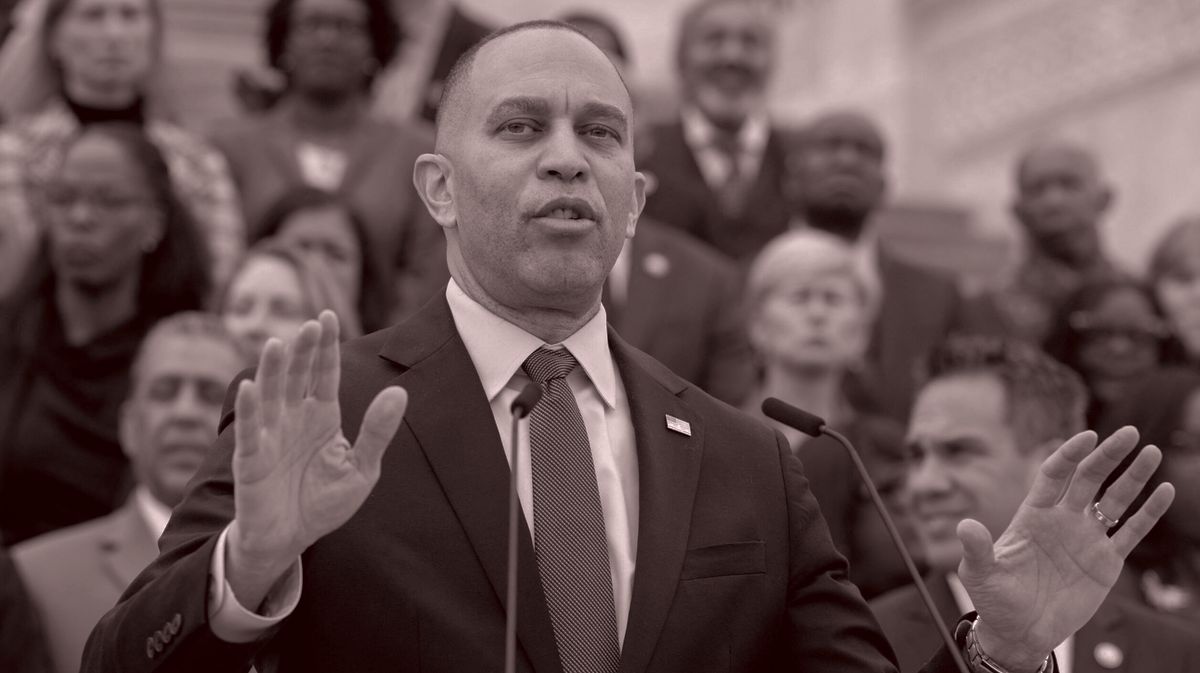Welcome back to The Best & The Brightest. I’m Leigh Ann
Caldwell, coming to you on this early springlike weekend despite that terrible time change.
For today’s issue, I’ve eavesdropped on the inner dialogue of Democrats as they face this week’s vote on Mike Johnson’s Trump-endorsed bill to fund the government beyond Friday. This is the first real test to see whether Democrats can meaningfully disrupt the Republican
agenda. But, in true Democratic fashion, the party is wrestling with itself over how to proceed on the vote—and perhaps most pointedly, whether approving the bill would be seen by voters as endorsing Elon Musk’s slash-and-burn DOGE offensive.
But first…
|
- Trust deficit: It’s not just Democrats who are twisting in the wind ahead of the funding vote. House conservatives who rarely vote to fund the government, and often enjoy government shutdowns, are also under immense pressure to vote “aye.” Johnson is leaning on Trump to bring wayward colleagues on board.
If Trump weren’t in the White House, there’s no way Johnson would be able to unite his entire party behind him—too many Republicans, especially fiscally
conservative hardliners, just don’t trust him. They’re frustrated by his survivalist willingness to turn to Democrats to pass legislation, as he did for the past few funding bills and last year’s defense spending deal. (No recent Republican speaker has funded the government without the help of Democrats.) In particular, Johnson’s decision to wrap aid to Ukraine inside a border security bill was seen as forcing their hand.
Trump has instructed Republicans to approve this week’s bill, both
on social media and during a recent White House meeting with a group of about 20 virulently anti-government Republicans. While he persuaded many to back the deal, including Freedom Caucus chair Andy Harris—who is, astonishingly, advocating on social media against a shutdown—I’m told that not all of them are on board just yet. Many of them have built their careers on opposing government funding. Trump’s cover is the only reason they’re even considering it.
- The economy, stupid: Trump’s whipsaw actions on tariffs and weakening economic indicators are prompting a lot of latent recession fears. On Fox News’s Sunday Morning Futures, Maria Bartiromo brought up the R-word directly to Trump. “I hate to predict things like that,” he told her. He went on to say, as he’s said before, that there will be “a transition” before things are “great.” That aligns with what Treasury Secretary Scott
Bessent signaled on CNBC last week, when he acknowledged that “there’s going to be a detox period”—another apparent euphemism for an economic downturn. Meanwhile, Commerce Secretary Howard Lutnick seemingly walked it all back in a very audience-of-one interview on Meet the Press, during which he noted that the administration’s policy will “absolutely not” lead to a slowdown. “There’s going to be no recession in America,” Lutnick added.
This commentary is
unlikely to reassure institutional investors—who have been rotating out of U.S. equities into short-dated Treasuries, Chinese tech stocks, and European weapons manufacturers—or even Republican members of Congress. (Read Dry Powder, my partner Bill Cohan’s excellent Puck private email, to learn what Wall Street C.E.O.s are privately
saying under their breath.) House members, of course, will be forced to craft more nuanced talking points in their districts as they face elections in a year and a half.
|
|
|
Not surprisingly, the Democrats are divided—within the party, and among chambers—about the upcoming shutdown crisis, and what to do if the government does, indeed, shut down.
|
|
|
House Democrats, depressed and divided, are still disoriented from Donald
Trump’s address to Congress on Tuesday night. Recent targets of their venom and second-guessing include the progressives who brought props; Rep. Al Green, who heckled the president and was escorted out by security; and the Democratic leadership, who had encouraged them to sit on their hands throughout the speech—resulting in footage of Democratic members sitting stone-faced while Trump honored Devarjaye “DJ” Daniel, a 13-year-old boy who’d survived
brain cancer. The angsty Wednesday morning quarterbacking has spilled into current conversations over government funding, one well-wired House Democrat told me.
The party, as directionless and leaderless as modern memory affords, must now countenance its first real legislative challenge of Trump II. As the government prepares to run out of funding at midnight on Friday—an outcome that would certainly lie on the shoulders of the Republicans in charge—the balkanized Dems find themselves at
the sort of philosophical crossroads that inevitably overwhelms the party’s Hamletesque instincts: How should they approach their first big consequential act of resistance under the new Republican regime? Joining Republicans to pass a bill extending government funding carries risks that no one seems able to pre-game. Nuking the bill would also prompt significant fallout. What to do?
On a principal basis, of course, this should be an easy one. Speaker Mike Johnson, at
Trump’s behest, is putting forward a six-month funding bill at levels lower than 2024 spending for nondefense programs—which should make it even easier for Democrats to hold the line in opposition. Meanwhile, I’m told by sources close to the White House and on the Hill that Trump doesn’t want a shutdown—a shift from his first term, when he welcomed the public relations middle fingers. Nowadays, the administration fears a shutdown would pull the focus away from the White House and its blitzkrieg
agenda. The economy is more precarious, too. Trump and his liaisons are also telling allies and members of Congress that the government’s lights need to remain on for continued DOGE chainsawing. Johnson, who has lost the trust of many in his party, is leaning heavily on Trump to help him secure the 218 votes required.
This is largely a mess of Johnson’s own rendering, of course. He punted the funding vote until now so that it wouldn’t derail his election as speaker back in January. But
it’s the Democrats who are most fretful about the politics of it all. The bulk of House Democrats believe any vote to fund the government would make them complicit in DOGE’s actions, and could be seen by constituents as giving Elon Musk a green light to keep going. But they also worry that if they vote against the funding bill, Republicans will frame the party’s actions as an endorsement of the ostensibly wasteful status quo.
Further complicating the
calculus is that House and Senate Democrats are not on the same page. In the Senate, Democrats are cautious about prompting a shutdown—worried about the political consequences if they provide Republicans with necessary votes. House Democrats are more willing to resist, even as they debate the real-life consequences for federal workers in a shutdown during the DOGE age, when agencies are already under siege. Some progressives who are supportive of a shutdown, however, do worry it would only make
it easier for Musk to fire people.
|
House Democrats are sluggishly coming around to depriving Johnson of votes on a partisan bill, a
sentiment echoed by Democratic Leader Hakeem Jeffries in a Friday letter to his colleagues: “Republicans have used their control of the House, the Senate, and the presidency to destroy the programs taxpayers deserve,” Jeffries wrote. He went on to say that House Democrats would “enthusiastically” support a bill that protects Social Security and Medicare, but that they “cannot back a measure that rips away” those programs. Medicaid, he added, “is our redline.” A
Democratic aide offered a more succinct translation: “If Johnson needs the votes, then he needs to fucking talk to Jeffries.”
The funding deadline has been an ongoing preoccupation among House Democrats since they helped Republicans with a three-month funding extension back in December—a short-term reprieve that Musk nearly blew up over the number of the pages in the bill, Democrats say. Since then, of course, the party has been furious that Musk and DOGE are slashing government programs,
and firing federal workers, without the consent or direction of Congress. Most House Democrats believe that the public will side with them—a fair bet, as Republicans are historically more associated with shutdowns. And Musk’s actions give Republicans little credibility with the public.
But there are still jitters. Not surprisingly, Democrats in vulnerable seats, such as Rep. Jared Golden of Maine—who represents a rural district that Trump won by more than nine percentage
points, and who could face a formidable candidate, former Maine Governor Paul LePage, in 2026—may see little upside in voting against the Republicans. There are also the old-school institutionalists, who think a government shutdown is bad under any circumstances. Some Maryland and Virginia Democrats, who represent the D.C suburbs that are home to government workers, worry about employees being furloughed, on top of the ongoing chaos and uncertainty of their
jobs. As of this weekend, Democratic leadership was still discussing whether they’ll whip the vote to keep their members united, or let members be free agents. The caucus will meet on Tuesday morning to discuss.
One Democratic strategist told me that internal polling shows that Republicans will be blamed if the government shutters, but added that what matters most is the messaging during a shutdown. The public could think Republicans are so anti-government, as
Musk has proven, that Trump and co. get blamed. Let’s see if that happens.
|
The dynamics in the Senate are a bit different. If Johnson can pass the measure out of
the House, it’s up to Republicans to find 60 votes for key procedural votes. With only 53 Republicans, and given Rand Paul’s complex stand on the topic, Republicans would need to find at least eight Democrats to support it.
The messaging war is complicated. After the sometimes too-earnest-for-his-own-good freshman senator Andy Kim
said on Meet the Press, in January, that Democrats should “use the leverage” in a shutdown to hold Republicans and DOGE accountable, Democrats have desperately been working to reframe the conversation, to place the onus on the Republican trifecta. At the moment, Senate Democrats are leaning heavily into ongoing but quixotic negotiations among the appropriators on actual spending bills, instead of a straight extension of 2025 funding, which is what Johnson and Trump are pushing.
In a rest-of-year funding extension, many of Congress’s directives on how to spend money fall away, giving the administration even more power to use the money how they see fit—something, obviously, that Democrats are adamantly opposed to given the circumstances. But an omnibus of new spending feels like an absolute long shot, and at best a plan B, should Republicans fail to fund the government.
Democratic Leader Chuck Schumer is keeping his cards close to his
vest, I’m told, even as the caucus debates how to handle the March 14 deadline. They are waiting, and hoping, that Johnson can’t get the bill through the House, before he reveals his cards. Another topic worrying Senate Democrats: While there’s a well-rehearsed playbook for how Republicans holdouts inevitably withdraw their protest votes, they have no idea how a Democrat-induced shutdown would actually end.
|
|
|
Unique and privileged insight into the private conversations taking place inside boardrooms and corner offices up
and down Wall Street, relayed by best-selling author, journalist, and former M&A senior banker William D. Cohan.
|
|
|
Join Emmy Award-winning journalist Peter Hamby, along with the team of expert journalists at Puck, as they let you
in on the conversations insiders are having across the four corners of power in America: Wall Street, Washington, Silicon Valley, and Hollywood. Presented in partnership with Audacy, new episodes publish daily, Monday through Friday.
|
|
|
Need help? Review our FAQ page or contact us for assistance. For brand partnerships, email ads@puck.news.
You received this email because you signed up to receive emails from Puck, or as part of your Puck account associated with . To stop receiving this newsletter and/or manage all your email preferences,
click here.
|
Puck is published by Heat Media LLC. 107 Greenwich St, New York, NY 10006
|
|
|
|























